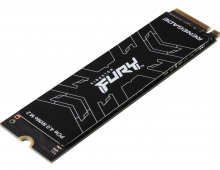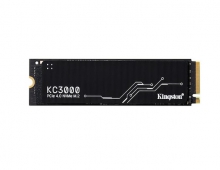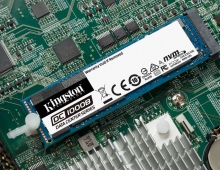Kingston HyperX 3K SSD 120GB Na`Vi Edition
3. HDTachRW, HDTune
Review Pages
Here is our testbed:
- Motherboard: Foxconn Quantum Force Rattler P67 vP04 BIOS
- Processor: Intel Core i5-2500K
- Case: Open Air testbed
- Power Supply Unit: Club 3D CSP-X1000CB 1000 Watt
- Graphics card: Club3D Radeon HD 6790 CoolStream Edition
- Memory: OCZ Gold PC3-10600 4x2GB 1333@CL9
- HDD: WD 500GB 7200RPM
- Monitor: LG L246WH-BH 24"
- Windows 7 x64 SP1 with latest updates installed
For the tests, we used the following software:
- HDTachRW v3.0.1.0
- HD Tune v4.50 Pro
- Crystal DiskMark v3
- ATTO Disk Benchmark v2.46
- ASS SSD Benchmark 1.5xxx
- IOMeter v2006.07.27 with Xtreme Benchmark template
- PCMark Professional edition v1.04
We start the tests with the HDTachRW software, which shows the potential read speed which you are likely to experience with the SSD. The software measures the sequential read speed, the random access speed and sequential write speed.
The average sequential writing speed was 379.9 MB/s and the average sequential reading was 416.3 MB/s /. Both figures are not exactly those quoted by Kingston, as it typically happens with the specific benchmark:
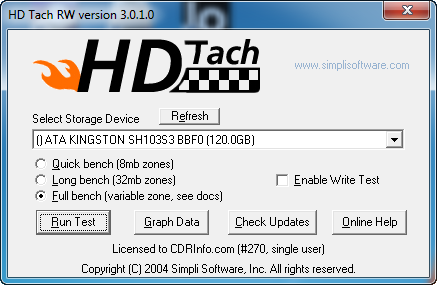
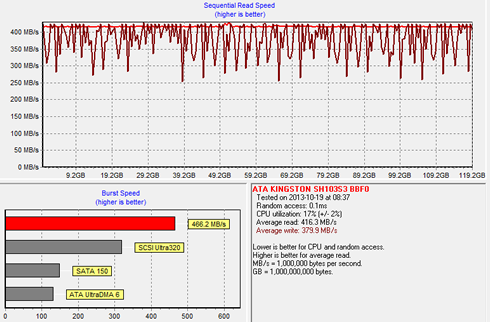
We move on to the HD Tune Pro software, another utility we use to measure the drive's reading and writing performances. Although not necessarily representative of real-world workloads, HD Tune's targeted tests give us a glimpse of each drive's raw capabilities.
The sequential reading test showed a 300.06 MB/s average speed for the SSD and the corresponding sequential writing test returned a 210.6 MB/s average - both lower than we expected:
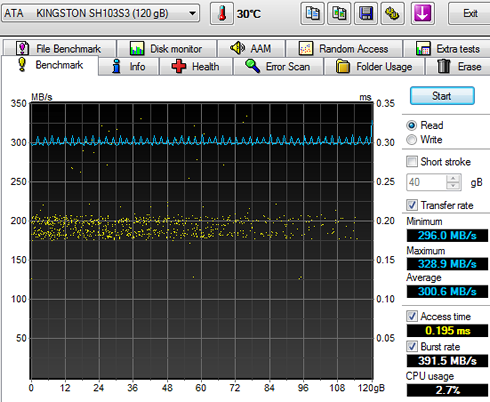
As you see in the screenshot below, writing was not stable across the data sequence resulting to a low overall average writing speed:

HD Tune's file benchmark consists of two parts: the transfer speed test and block size test. The transfer rate test measures three different parameters for both reading and writing:
- Sequential: the sequential speed is measured and shown on the graph. Ideally the transfer speed line should be straight and smooth.
- 4 KB random single: this test measures the performance of I/O operations of 4096 byte blocks - the most common I/O operation on a typical system. Especially the 4 KB write speed is an important indication of general system performance.
- 4 KB random multi: this test is similar to the 4 KB random single test except that multiple requests are sent simultaneously to the device. We set the number of operations to 32.
Below you see random reading test, in which we noted a 450.156 MB/s average reading speed for an 1MB transfer size and a 393.831 MB/s average reading for transferring files with random sizes:
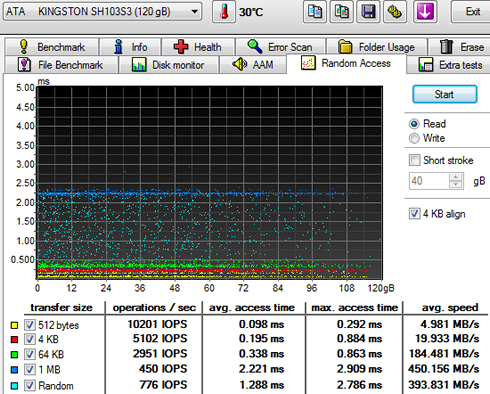
Random writing of 1MB files was also fast at 468.180 MB/s, and slower at 372.624 MB/s with random files:
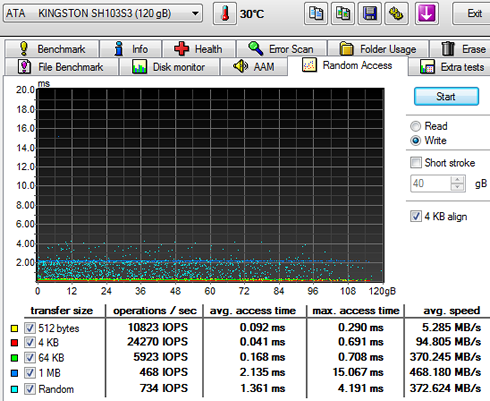
Review Pages

